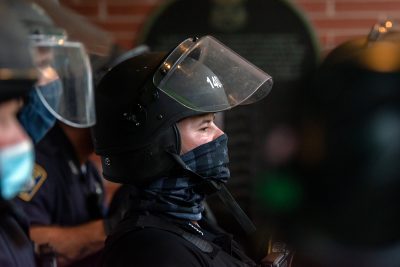Police reforms are on the table in the City of Boston.

The City Council Wednesday confirmed orders for two future hearings: one to discuss the reallocation of the Boston Police Department’s overtime funds, and another to discuss upcoming police contract negotiations.
The orders follow Mayor Marty Walsh’s proposal to cut $12 million, or 20 percent, of BPD’s overtime budget. The money would then be repurposed toward efforts combating systemic racism.
The mayor’s decision, announced on June 12, came as a response to national calls for police reform and years of controversy surrounding Boston police officers’ rising salaries.
This fight for change will take time and patience, said District 8 City Councilor Kenzie Bok, chair of the Council’s Ways and Means Committee, which oversees city spending.
“Dismantling structural racism in our society is an enormous task,” Bok said. “Anything immediate is also pretty easy to immediately reverse.”
The first order calls for a hearing to ensure the $12 million cut is effectively repurposed into city programs involving minority economic development, as well as housing and mental illness support.
The order also calls for quarterly reviews of BPD’s spending to establish and maintain overtime budget discipline within the department — which commonly overspends, the councilors said at the meeting.
Bok said she aims for the hearing to occur within the next several weeks.
Since 2011, BPD payroll has increased by 43 percent, while overtime pay grew 84 percent, according to a review by The Boston Globe. More than 500 BPD employees earn a salary higher than $200,000.
These rapid, disproportionate increases in police spending have dwarfed other programs’ budgets, Bok, who co-sponsored both orders, said.
“Every dollar that we run over for this overtime is dollars that we can’t move into the other critical priorities of the city,” Bok said during the meeting.
Bok said in an interview that public safety workers have “run way ahead” of civilian city workers in their compensation.
“That pattern, over and over, has really exacerbated a gap that isn’t fair and that doesn’t make sense,” Bok said.
This year, the police department’s $60 million overtime budget is larger than the operating budgets of community-focused departments like the Boston Public Library — $41 million — and the Department of Neighborhood Development — $29 million — according to the order.
Despite the budget’s size, BPD likely exceeded its overtime allocation by around $8 million, Bok said. The department has a unique legal ability to run overtime “for public safety reasons,” she said, which makes it difficult to accurately predict costs.
“The No. 1 thing that we need this year is really an attitudinal shift,” Bok said, “where both the police department and the Office of Administration and Finance under the mayor really feel accountable for hitting that target.”
Bok said the 20-percent reduction could yield $20 million in savings if paired with stronger budget accountability.
District 6 City Councilor Matt O’Malley, a co-sponsor of the order, said during the meeting that BPD’s work culture encourages overtime as “normal rather than an unusual practice,” leading to frequent overspending.
Currently, officers can work up to 90 hours a week, O’Malley said.
That allowance not only normalizes overtime work, but endangers officers’ health and undermines their performance, City Councilor Julia Mejia said during the meeting.
The second City Council hearing will discuss expectations for upcoming police contract negotiations.
Boston’s previous police contract, which was first drafted in July 2016 and will remain in effect until new terms are agreed upon, dictates that overtime be rounded up in 15-minute increments.
In addition, it stipulates that officers be guaranteed a minimum payment equal to four hours of overtime if called back to work after a regular shift — regardless of the actual number of hours worked.
The union-backed contract also outlines disciplinary procedures for BPD officers, stating only that they cannot be “disciplined or discharged without just cause,” and that disputes must be filed with the Massachusetts Civil Service Commission.
Issues of police reform are fundamentally tied to contracts, Bok said, because Massachusetts considers discipline and accountability to be “legitimate subjects of bargaining.”
The Council is not directly involved in negotiations between the City and the Boston Police Detectives Benevolent Society, BPD’s collective bargaining agent.
However, by setting clear expectations beforehand, Bok said it can guide the negotiation indirectly.
District 1 City Councilor Lydia Edwards, who has a background in labor law and co-sponsored the second order, said during the meeting that police unions have a unique power: members are authorized to use deadly force.
“I’m looking to see how we are encouraging courageous, ethical policing in Boston,” Edwards said. “I’m encouraged to see how that contract reflects it.”
Edwards said she would push her colleagues to vote against any new contract that does not incentivize ethical policing.
If the Council does not approve the upcoming contract, it will be sent back for revision. Bok said she hopes both hearings will take place as soon as possible to start paving the path for reform.
“If somebody says, ‘I want to go to the top of this mountain,’ and you say, ‘Okay, it’s 10 miles away; let’s start walking,’ that’s not waiting,” Bok said. “That’s acknowledging the enormity of the task.”






















































































































